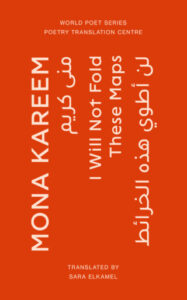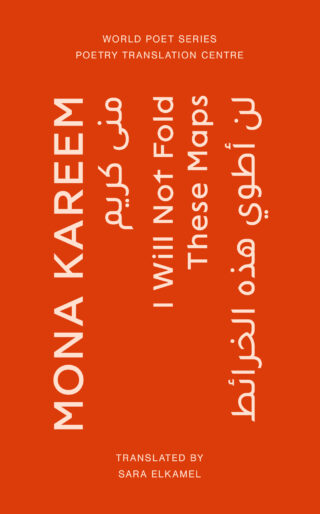By MONA KAREEM
Translated from the Arabic by SARA ELKAMEL
Reviewed by SUMMER FARAH

My first encounter with Mona Kareem’s work was not her poetry, but her essay in Poetry Birmingham on the trend of Western poets “translating” from languages they are not literate in. Kareem brings attention to what she calls the “colonial phenomenon of rendition as translation,” in which a poet effectively workshops a rough translation done by a native speaker or someone who is otherwise literate in the original language. Often, this is the only way acclaimed writers reach Western audiences. I was excited, then, to see that I Will Not Fold These Maps, Kareem’s first collection translated to English, defies this trend. Presented with the original Arabic alongside the English translated by Egyptian poet and journalist Sara Elkamel—for whom this work is a debut full-length translation—this book is a mixture of Kareem’s previously collected work alongside brand new poems, presenting a great overview of her work. I Will Not Fold These Maps’s execution as a collaboration between Arab poet-translators only strengthens the experience of reading it, filled with poems that vividly explore exile, grief, and writing and its relationship to resistance.
I Will Not Fold These Maps opens with a poem titled “Perdition”; it reads,
Roses jump to their death
from the rails of my bed
as my mother
tries to tuck me into the desert of life
*
In the courtyard of my soul
is a small devil—
a newborn
It is a stark beginning, situating the reader immediately in Perdition, or Hell, or the end; this poem is a series of strange, brief moments. “I” is absent, despite being a first-person perspective; instead, we read, “my mother,” “my soul,” and a later line, “my eye’s abyss”—the speaker is made up of what is in proximity to them. This way of introducing the poetic voice felt appropriate, alluding to the quote that Elkamel cites in her introduction to the collection: Kareem says, “I was a poet before I was a woman.” There’s a youthfulness to this speaker, constructed first by image rather than the assertion of the “I,” a fitting beginning for a poet that jokes like this. I found the lack of “I” even more interesting once I reached the end of the collection, where in the last poem, “The Migrant Poet Slaughters His Voice,” there is the line: “In our languages, he finds himself placing nouns before verbs, / tainted by the lyrical I, perhaps” as the poem engages with the violences of rendering lives through the poetic. I recall Solmaz Sharif’s line in Customs: “For years I wrote of the bumps / left by the tanks / churning over her roads / as braille messages from the martyrs, / which meant I missed / it entirely, / the only / it: / my mother’s face” and am excited by the continued questioning of the act of writing poetry raised in the work of contemporary SWANA writers. In Kareem’s work, the poem inhabits the poem, and the act of writing is present in the worlds she creates.
I love the moments where poetic space, or images conjured by metaphor, muddle into “real” space, giving the act of poetry power. One such moment is in the piece that gives the collection its title, “Cities Dying Every Day”:
I will not fold these maps
it might dent my country’s nose,
prompting a raid on all our pockets
for emergency plastic surgery
A sharp, quick state critique–-as if even the arbitrary bending of borders on a piece of paper is too offensive for a nation that renders those who live within its boundaries without dignity; too, this line emphasizes the fragility of those borders, and their false priorities. Kareem’s humor is efficient here, and is one of my favorite flairs that recurs throughout the collection.
Whenever I read work translated from Arabic or Farsi, I am reminded how rarely American English poetry utilizes exclamation points; a pity! In her essay on translation, Kareem points to this, in that punctuation must be translated and not just copy/pasted. She writes,
In Arabic, italics and formatting are not a feature of literary writing, while punctuation, though present, is not a regulated business like it is in English… punctuation too must be translated. What comes as an intervention in the Arabic poem, must also be reinvented as such in the English. If brackets and dots do not resonate similarly in English poetry, they should have been substituted with italics and formatting, to give one solution.
With this in mind, I paid close attention to Elkamel’s choices; exclamation points occur throughout the collection, but they felt particularly prominent and effective in “In Praise of Modernity.” The tone was initially difficult to parse, and so I wondered if something had been “lost” in the translation; my literacy in Arabic is very basic, in that I can read the words but not so much the feeling. I read several of the poems in this collection alongside my mother, in order to affirm both my understanding of Elkamel’s translation and nuances that may be lost in between. Translation itself is an art, and the poems in English are a product of both Kareem’s work and Elkamel’s own musicality, and so of course there is value in evaluating the English on its own merit. It was in the back-and-forth of this poem between languages, however, that I felt I understood it most; fitting, for a poem about expatriation. The idiomatic beginning, “I could be a turtle / you drive around in your bag” is so fun and strange, and asks to be read aloud. The observations the speaker carries us through are made more alive when witnessed with another.
Kareem’s humor-towards-state critique returns near the end:
Only laundromats in America
respect cultural diversity—
you might wash your clothes after your enemy’s,
convinced that your sweat
won’t mingle!
This stanza, and the next (“I love the city. And I really do love modernity—if only because I can’t stand insects!”, which made me laugh) follow this similar construction of em-dash and exclamation point; the Arabic, instead, has commas where the em-dash occurs. I really enjoyed the choice in English, pausing the line and emulating a punchline about to be delivered.
The absolute stunner of a prose poem “Lot’s Wife” comes as the second-to-last in the book, an effective placement—the preceding poems are stanzaic and economical, often alike in their form. “Lot’s Wife” breaks the collection’s consistency, and its singularity allows the poem to shine. The attention to writing returns, in this passage:
“Perhaps if she had waited until she reached the cave before letting nostalgia overwhelm her, the plot of cosmology would have gone in an entirely different direction. In fact, it might have needed in that cave, and left us in peace. Why wouldn’t the Lord understand that all she wanted was to write a poem about ruins? Is it because men have a sole claim to ruin?”
As the spotlight on translation in mainstream literary spaces continues to grow, I try to stay attuned to conversations between writers and translators from marginalized backgrounds discussing the complexities and anxieties attached to this act. Translation is an art, yes, but it is an accessibility tool—to make a text legible and accessible in more contexts. What are the costs of these contexts? In an interview at the Poetry Project conducted by Marwa Helal, writer and translator Carina del Valle Schorske answers the question “Why is translating women by women (by indigenous or nearly native speakers) important (read: necessary)?” as so:
“Concretely speaking, translators often get asked to speak not only for the writer they’ve translated, but for that writer’s culture. And in some sense this isn’t wrong—ultimately a translator should be working from a holistic curiosity about the world language lives in… Even if the translations are good, it can work as a kind of cultural colonialism. But I’m less concerned about these voices getting claimed by white men with little connection to the culture than I am about white men reinforcing, through translation, regimes of prestige… Who we choose to translate is just as important as how we choose to translate.”
Kareem is bidoon (stateless) from Kuwait, and vocally critical of its government; in his afterword, André Naffis-Sahely states that Kareem’s work is banned in her home country, and she herself is unable to return. I’ve carried this interview with me when I have engaged with translations, trying to think past the truth of opportunity—who is afforded the time and luxury of translation?—and towards the implications of what happens when one’s voice is filtered through another. As I hold this fit-in-your-jacket-pocket edition of Kareem’s work, I can’t help but think about the significance of Elkamel as translator within the masculine space of translation. Kareem’s commentary on creative misogyny and its proliferation in religious texts—as seen in “Lot’s Wife,” as translated by another Arab woman—feels productive. Often, when I am reading translations, I feel sadness for how the work arrived in my hands—whether it be the languages of interest in the eyes of the US state department or the fetishization of an other that drove the translator to fluency. Here, though, the layers enhanced the experience.
In the same way that the poems before “Lot’s Wife” set the stage for this poem to stand out, its placement re-orients the reader for the last poem, “The Migrant Poet Slaughters His Voice.” I love the sort of meta-reference to the pieces before it, with the line “I let him jumble the clocks, talk to me / about the prose poem—/ how it stands like a bare trunk, interrupting the horizon: / They have stolen our music” (and how this line, too, feels like it mirrors the moment in the earlier poem, “Remains”: “We need music here. / We need it more than trucks of bread.”) Like others before it, this poem is concerned with poetry and what it does, engaging with the delusions of the poet.
I found this line from “The Migrant Poet Slaughters His Voice” to be a stand-out: “The poet thinks he can / heal the dumb, and revive the dead.” Like many of the lines that led me to read and re-read, it is sharp and economical. Elkamel uses the antiquated “dumb” to translate “الأكم” (meaning mute, ignorance, an abundance of definitions). I struggle with this choice, as “dumb” is a term with ableist histories and connotations in English, especially in this context; I understand the metaphorical heft, in which a poet wills the unwilling to speak, and a generous read of the literal is the poet’s desperation to not care about the implications of this desire. Tonally, the choice makes sense; this poem is filled with violences unto the poet, but I still wonder about the recreation of a violence here, and what it is worth. But, I think these questions reify the intent of the poem itself, too. Despite my hesitations, the layers presented in this line and its translation are indicative of the experience of reading this collection—there is an abundance to glean from these poems. Lovingly translated and cradled by a strong introduction and afterword, I Will Not Fold These Maps is an excellent volume and way into Kareem’s work.
Summer Farah is a Palestinian American poet, editor, and critic based in California. She organizes with the Radius of Arab American Writers.




